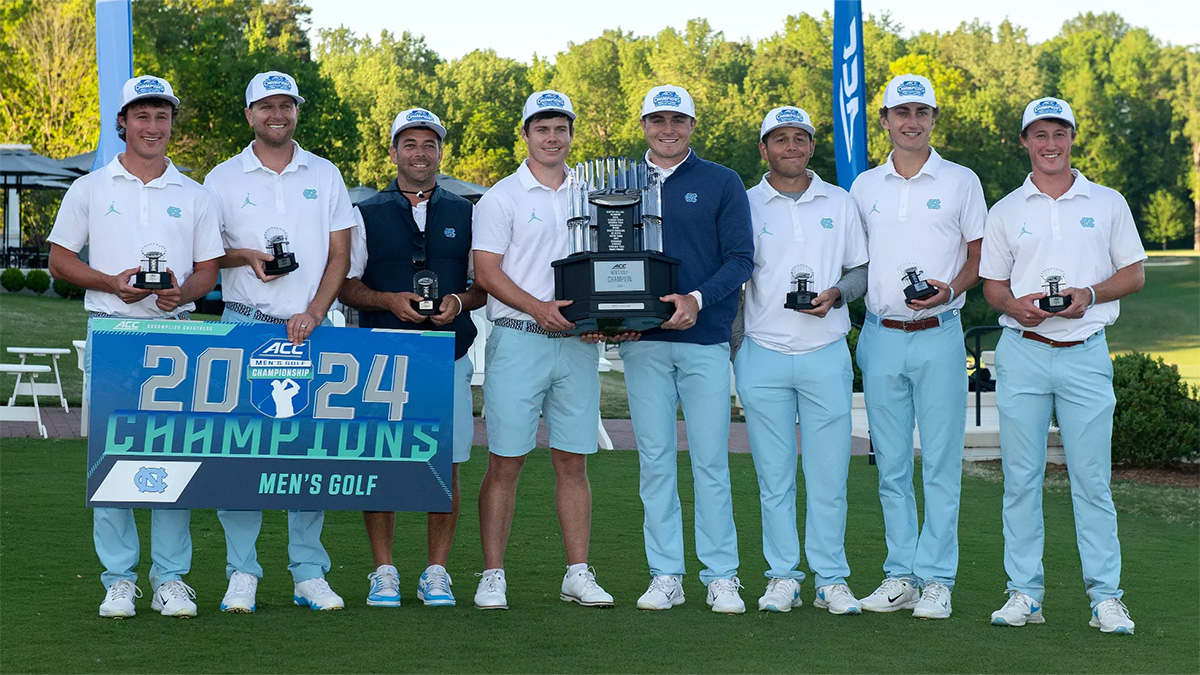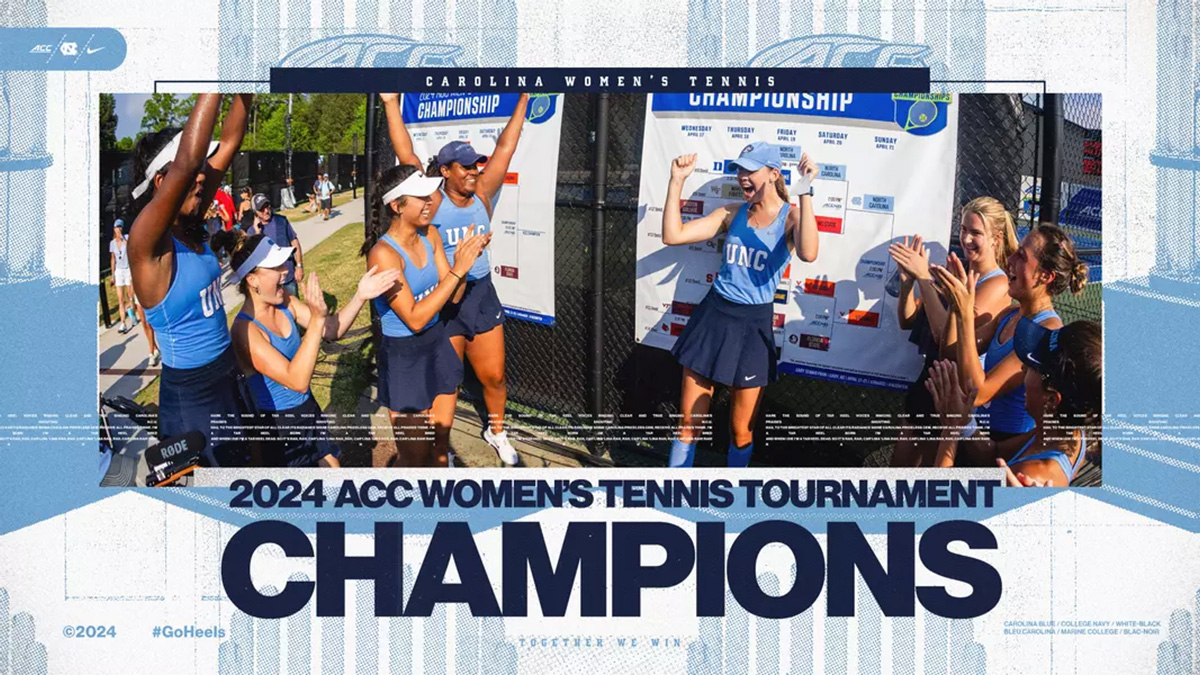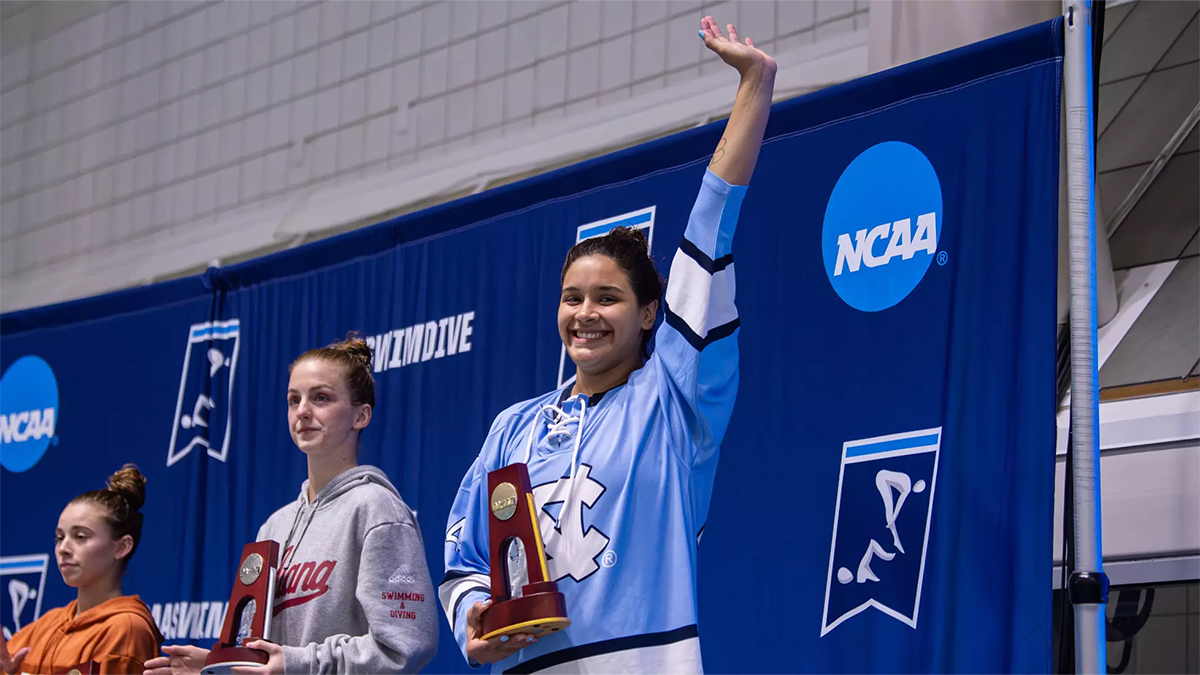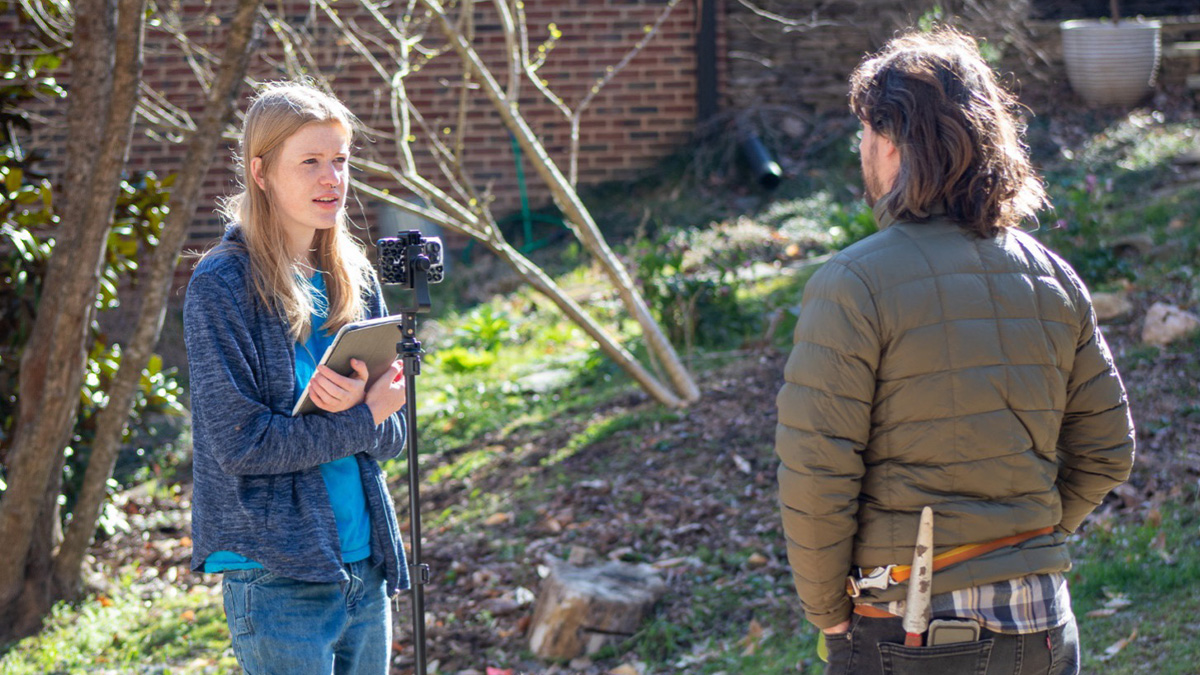A golden era of Tar Heel swimming
Early success paved the way for the Carolina women's swimming and diving program.
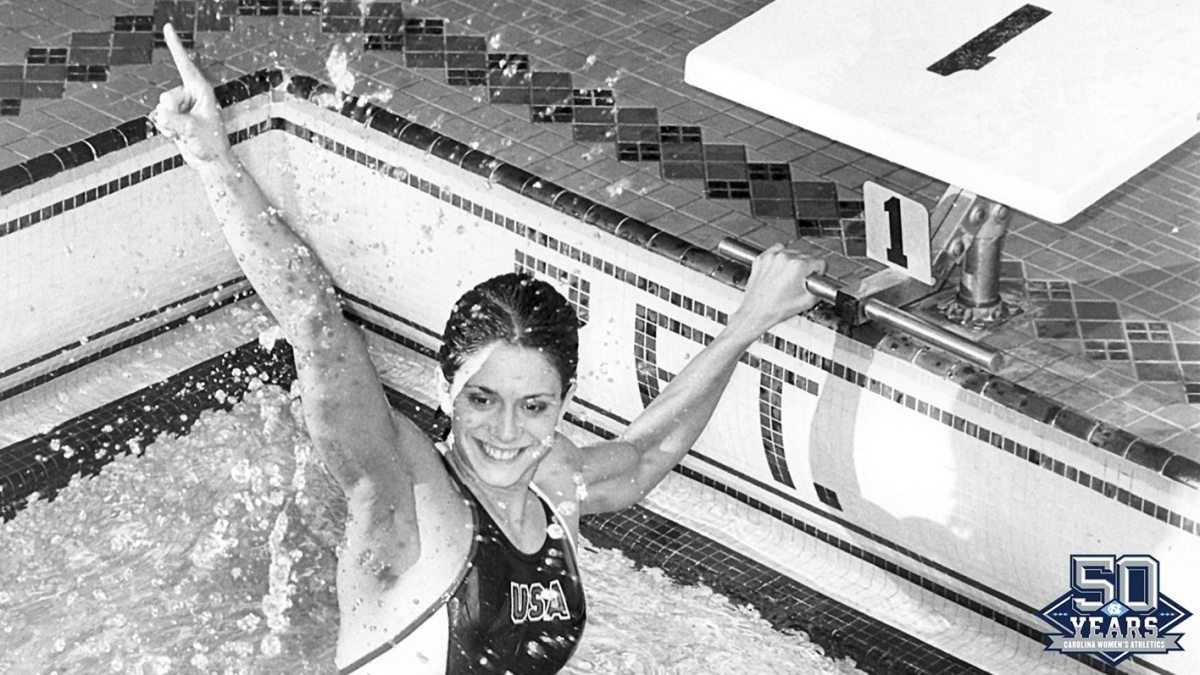
Carolina’s women’s swimming and diving program has had a multitude of successes over its 50-year history: 16 Atlantic Coast Conference championships, 40 national Top 30 finishes, and a flurry of individual national champions and Olympians.
But it was in the earliest years of the program that Carolina experienced its true golden era – and set the standard for what the program has achieved.
The program has had only four head coaches since 1975 and each has produced championship level teams, including the recent 12th-place national finish in 2021 under current head coach Mark Gangloff.
“The foundation of the women’s side of our program was established early here at Carolina,” says Gangloff, a two-time Olympic gold medalist. “These incredible coaches and athletes paved the path for generations of women student-athletes and built a program that has had a lasting impact on Carolina and the sport of swimming for decades.”
This golden era, from the late 1970s into the early 1980s, saw UNC-Chapel Hill flourish under the guidance of two young dynamic coaches – Jim Wood and Frank Comfort – and with them, Carolina competed, and finished, at the top of the national collegiate competitions for over a decade.
Starting in 1976, Carolina earned nine top-10 finishes consecutively, then a string of six straight ACC titles from 1981-86 (the program has gone on to win 10 more ACC championships since 1986). Those nine straight Top 10 national finishes marked the highest peak of this golden era.
In those days, Carolina competed in the Association for Women’s Athletics national championship from 1976 through 1981 before the NCAA took over sponsorship of title meets beginning in 1982.
Wood coached the Tar Heel women from 1975-77 before returning to his native New Jersey and eventually serving as the president of United States Swimming. He was replaced at Carolina by Comfort, who coached at Carolina from 1977 through 2007. Both coaches came to Carolina initially in a similar fashion.
Comfort attended Syracuse and came to Carolina in 1967 to earn his Master of Arts degree in teaching while serving as an assistant to then head swimming coach Pat Earey. Comfort earned the coaching job at Johns Hopkins in 1968, leading the Blue Jays to a Division III national championship in 1977.
Wood himself attended Johns Hopkins, graduating in the Class of 1972 and took Comfort’s advice to come to Carolina the following fall to pursue his M.A.T, attending the program in the same year as another Tar Heel leader, Roy Williams.
When Director of Athletics Homer Rice sought to combine the men’s and women’s coaching duties in 1975, he tapped Wood to take over, marking the start of an incredible run for Tar Heel swimming.
That fall saw the enrollment of Ann Marshall, from the Pine Crest School in Florida, the first women’s swimming scholarship athlete at Carolina. Marshall was only the second overall female scholarship recipient at the University, behind tennis player Camey Timberlake.
At age 14, Marshall earned a spot on the U.S. Olympic Team in 1972, and in her freshman year at Carolina in 1976 she captured AIAW individual national titles in the 200-yard backstroke and 200-yard freestyle.
A year after Marshall arrived at Carolina, Bonny Brown joined UNC from Pine Crest. A gold medalist in the 1975 Pan American Games, she broke the American record in the 100-meter freestyle in 1976. As a freshman in 1977, she won the AIAW individual title in the 100-yard individual medley.
After her senior year in 1980, Brown became the first female recipient of the Patterson Medal, the most prestigious athletic honor at Carolina, recognizing Carolina’s outstanding senior athlete.
To this day, Brown has fond memories of her experience at Carolina.
“We had a large team, and I always felt there was strength in numbers. We had a blast swimming together at Carolina. We were a family, and I was called Ma Brown for a reason,” she said. “My four years at Carolina were the most important growth period I had in my life. The atmosphere allowed me to use my God-given ability to excel in the pool and personally.”
Key additions to the team included distance swimmer Lauren Dupree, breaststroker Janis Hape, distance specialist Wendy Weinberg, sprinter Barb Harris, breaststroker Gayle Hegel as well as versatile standouts like Laurie Potter, Madelyn Warcholik and Dale Alton. Hape and Weinberg both were named to the 1976 U.S. Olympic team to compete in Montreal.
“We were fortunate that we attracted a lot of swimmers who wanted a great education and wanted to get to a place ahead of the crowd and establish our program as one of the best nationally,” Comfort said. “We were a pioneer in the sport in the 1970s in terms of offering scholarships and the quality of the people we attracted reflected that.”
When Comfort returned to Chapel Hill to become the head coach, he arrived at Carolina to find he had no office. The University built one for him in the upper level of Bowman Gray Pool, an aging facility from the 1930s which hosted NCAA championships in 1949 and 1957.
The venerable, but aging, facility would soon need to be replaced, however. The success of Comfort and his teams led to the push to fundraise and build the Maurice J. Koury Natatorium. The new facility opened in 1986 and still serves as the home of the Tar Heels.
Comfort hit the ground running, and his initial recruiting classes reflected his efforts to continue to see the Tar Heels competing nationally at the highest level. His first two classes included student-athletes who led Carolina to new heights both in the ACC and nationally – swimmers like Karen Hoff, Cindy Shirey, Cynthia Chilcott, Nance Thompson, Sally Winde and Barb Harris.
Comfort also welcomed Weinberg in 1978 as a transfer from Virginia. A bronze medalist in the 800-meter freestyle in 1976 in Montreal, the Baltimore native was coached by Comfort as a club swimmer before college.
The head coach relied on a large group of assistant coaches during the early years of success, including staff members like Rich DeSelm.
DeSelm had a unique perspective in that he swam at Carolina from 1974-78 and was an assistant coach at Carolina from 1978-92 before returning to become the head coach of the Tar Heels in 2007.
“I swam at Carolina when, honestly, the women were better than the men,” DeSelm said. “I embraced that atmosphere and it was part of the reason I was excited to join Frank’s staff. I fully understood that not only was the women’s team really good, but they wanted to be great.”
Comfort and his staff boosted the Tar Heels in 1980 with the arrival of a freshman class that included Amy Pless, Cami Berizzi, Jenny Strickland and Sue Walsh. Those four individuals won four conference team championships and finished in the top-10 each year in the national meets from 1981-84.
“We were blessed with a group of women who really wanted to be good,” says Comfort. “We brought in a class with great leaders and, from the get-go, we were successful with this particular class. Sue, a 1980 Olympian, came to Carolina from Hamburg, New York, and we recruited Cami from Connecticut. Cami could have gone anywhere, and even though she swam the same events as Sue she wanted to be part of something special in Chapel Hill.”
Recruited to Carolina at a time when under AIAW rules prospective student-athletes had to pay for their own recruiting trips, Walsh visited Chapel Hill on her own dime. She had already visited Michigan and admitted the trip to Stanford was too expensive when she came to Carolina for her visit.
“When I visited in March 1980, I honestly did not know much about the school but I saw the swimmers Frank was bringing to Chapel Hill and I wanted to be a part of that group,” Walsh said. “Once I saw the place and knew what it was about, I decided right on the spot that it was the place for me.”
Comfort was right. Something special did happen in Chapel Hill, as the women’s team reached its highest-ever national success.
Walsh would go on to be one of the most decorated athletes in Carolina history. In her time in Chapel Hill, she won 10 individual national championships from 1981-84. She won the 50- and 100-yard backstrokes in 1981, the 50-, 100- and 200-yard backstrokes in 1982 and 1983 and the 100- and 200-yard backstrokes in 1984. She became the second female recipient of the Patterson Medal in 1984.
Walsh’s teammate, Barb Harris, then won the NCAA title individually in her senior year in the 50-yard butterfly in 1982. Another key element in the teams of that era was U.S. National Team member Polly Winde, a Baltimore native, who was on four conference championship teams from 1983-86 and was an NCAA runner-up in the 400-yard individual medley.
Carolina’s relay national championship came in 1981 when the trio of standouts – Walsh, Pless and Berizzi – combined with Harris to capture the 200-yard medley relay at the AIAW championship meet and set an American record in the process.
“We had a core group of incredible athletes and some of us swam the same events, so we were competing for conference and national honors within our own team,” said Walsh. “But it was always healthy competition. We all wanted to win as a team. We constantly pushed each other to be better. We were doing the things we needed to do for individual success but also to make sure our team succeeded on the national level. We were composed of a group of very talented and dedicated team players.”
The program did succeed on a national level, creating a lasting legacy that continues to this day as Carolina’s golden era set the standard and paved the way for women’s swimming for the many years ahead.
This year, Carolina Athletics is celebrating 50 years of women’s athletics with a series of stories and social media content celebrating our many champions, legends and leaders who have shaped the landscape of women’s sports in Chapel Hill.
Learn more about the 50 years of Carolina women’s athletics
